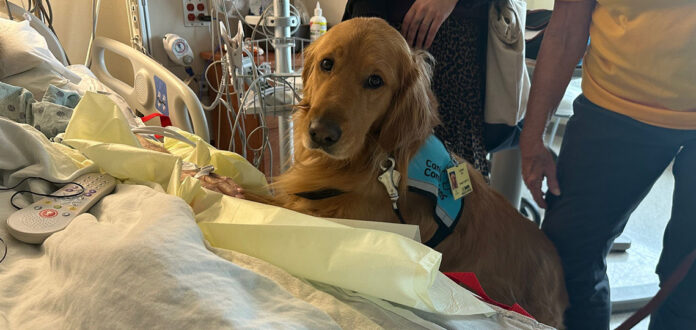Newly-employed golden retriever Landon has been brightening up hospital rooms at UC Davis Health
By KATIE HELLMAN — science@theaggie.org
Landon, a two-year-old golden retriever, has an important job: to cheer up hospital patients. Equipped with a wagging tail and a joyful spirit, Landon distracts people from a stressful time in their lives with his warm presence.
He is specially trained to provide comfort to adults and loves to work off-the-clock by visiting hospital staff. Landon is part of UC Davis Health’s Creativity, Amenities, Relaxation, Exploration (CARE) Project, which uses an interdisciplinary approach to holistic healthcare, employing activities like art therapy and reiki, a form of energy healing.
“By supporting the whole person, caregivers, and family members, we hope to empower a patient throughout their hospitalization with empathy, compassion, and understanding,” CARE’s website reads.
Canine CARE, currently consisting of a team of six dogs, specifically aims to help patients cope with an illness through the use of therapy dogs.
To qualify for his important role, Landon had to first pass his Canine Good Citizens test, allowing his handlers to make sure he would be friendly, obedient and gentle while interacting with patients. Landon did exceptionally well on his test; he kept his focus when surrounded by commotion and refused to give in to meticulously placed distractions, such as a stuffed animal dog blocking his path.
Katie Lorain, the Creative Arts and Recreation Therapy department manager at UC Davis Health, commented on the impact that the dogs have on patients’ well-being.
“The main purpose is to normalize the hospital experience,” Lorain said. “Many of our patients are missing their personal pets when they are admitted for a long time, and even if they don’t have a dog, [the dog] is just something that reminds them of the world outside of the hospital. It can lift their spirits and it can motivate them to engage in treatments, like ambulating or getting up and out of bed so they can walk with the dog down the hallway.”
The impact of therapy dogs doesn’t just stop after their visit — they can actually promote physical healing and have positive long-term effects on human health, according to a study published in PubMed.
“When humans are faced with a stressful or unknown situation […] the steroid structured hormone cortisol is released,” the study reads. “Studies in humans investigating stress biomarkers found that when people are engaged with interacting or stroking a dog, sensory stimulation in both the human and the dog can activate oxytocin and decrease cortisol levels in humans.”
Anyone interested in learning more about the CARE program can check out their website and support the CARE project fund by visiting their UC Davis Crowdfund.
Written by: Katie Hellman — science@theaggie.org










